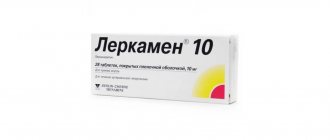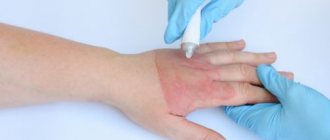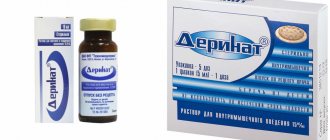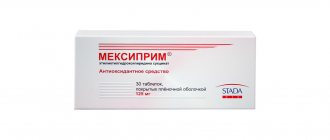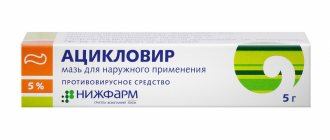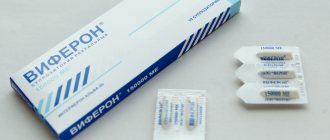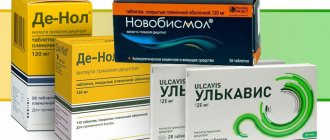Dizziness and headaches are often associated with increased blood pressure. To stop an attack, including relieving the symptoms of a hypertensive crisis, you can use inexpensive Dibazol tablets or injections. This is one of the most affordable medications that can be taken by both adults and children.
Contraindications
The drug is contraindicated in diseases that are accompanied by increased muscle tone or convulsive syndrome. Hypersensitivity to the drug.
With caution - long-term use as an antihypertensive drug in elderly patients (decreased cardiac output).
Pregnancy and lactation period
Since there is no data on the safety of the drug for the fetus, it cannot be used for a long time during pregnancy. During breastfeeding, use only when the benefit to the mother outweighs the potential risk to the baby.
How does the drug affect the body?
Bendazole has a complex effect:
- preventing spasms;
- expansion of the walls of blood vessels;
- short-term decrease in pressure;
- myotropic effect;
- decreased smooth muscle tone;
- increased blood flow to myocardial cells suffering from a lack of oxygen (this is especially common in coronary artery disease);
- strengthening the immune system by stimulating the production of interferon (in this sense, the effect of the drug is similar to the therapeutic effect of Levamisole).
The active component also improves contact between neuron synapses in the tissues of the spinal cord. Therefore, it is also used to treat nervous system disorders.
The components of the drug are well absorbed in the walls of the gastrointestinal tract. The therapeutic effect begins 30-60 minutes after administration and lasts for 2-3 hours. The drug is mainly excreted in the urine, and to a small extent in the feces.
Directions for use and doses
Dibazol is prescribed orally, intravenously or intramuscularly. Take 0.02–0.05 g orally 2-3 times a day, usually for 3-4 weeks or in shorter courses. Higher doses for adults orally: single 0.05 g, daily 0.15 g. Children are prescribed (for the treatment of diseases of the nervous system) in the following doses: up to 1 year - 0.001 g, 1-3 years - 0.002 g, 4-8 years – 0.003 g, 9-12 years – 0.004 g, over 12 years – 0.005 g. If necessary, the course of treatment is repeated after 3-4 weeks. In case of hypertensive crisis, 30-40 mg (3-4 ml of 1% solution or 6-8 ml of 0.5% solution) is administered intravenously or intramuscularly. Note: Since bendazole is poorly soluble in cold water, it is advisable to slightly warm the injection solution before use to avoid the formation of sediment. In case of exacerbation of arterial hypertension in case of increased blood pressure, 20-30 mg (2-3 ml of 1% solution or 4-6 ml of 0.5% solution) is administered intramuscularly 2-3 times a day. Other antihypertensive drugs can also be used simultaneously with Dibazol.
Description of the drug "Dibazol"
The medication is produced in the form of tablets, which contain 20 mg of an active substance called bendazole. Another form of release is a solution, 1 ml of which contains 5 or 10 mg of the active ingredient. Tablets are packaged in 10 pieces, the solution comes in 2 ml containers (10 ampoules in one package).
Ampoules and tablets are stored under normal room conditions at a temperature of no more than 30 degrees. In this case, avoid exposure to direct sunlight. Access for children is prohibited. The product can only be used within the expiration date - for tablets this is 5 years, for solution - 4 years from the date of production.
Overdose
When using Dibazol in high doses or exceeding the treatment period recommended by the doctor, negative symptoms are observed. Overdose manifests itself as follows:
- excessive sweating;
- feeling of heat;
- attacks of nausea;
- dizziness;
- decrease in blood pressure.
There is no specific antidote for overdose. Medical care is aimed at inhibiting the absorption of the main component from the gastrointestinal tract into the blood. It is necessary to induce vomiting, rinse the stomach and take any enterosorbent, for example, Smecta, activated carbon, Enterosgel. In case of prolonged intoxication with Dibazol, step-by-step syndromic therapy is required.
Contraindications and side effects
The medication is not used in cases where the patient has an individual intolerance to the main or additional components. The drug should be used with caution in the presence of the following diseases and disorders:
- diabetes;
- low pressure;
- ulcers of the gastrointestinal tract;
- severe forms of heart failure;
- decreased muscle tone;
- old age (short-term use is allowed in consultation with a doctor).
The drug is prescribed with caution to patients whose work requires a high concentration of attention (driving cars, moving machinery). In this case, you need to monitor your well-being - there may be a lack of coordination, as well as dizziness. If such signs appear, you should stop taking it and consult a doctor.
Side effects are rare. They are mainly associated with dysfunction of the left ventricle of the heart. However, the effect is minor and can only be recorded on an electrocardiogram. The following manifestations are also sometimes observed:
- allergic reaction;
- decreased blood pressure;
- dizziness;
- general weakness.
Buy "Dibazol": price, analogues, reviews
You can buy the drug in pharmacies with a doctor's prescription. The product is sold at an affordable price - 50-70 rubles per pack of 10 tablets. For about the same amount you can buy injections - 10 ampoules of 1 ml.
Analogues of the product include Oxibral and Halidor. Judging by the reviews, Dibazol is highly effective - it is recommended by more than 90% of patients. Among the advantages are the affordable price, the absence of side effects, and a tangible effect. However, they note that the drug cannot be used for a long time by older people.
What does Dibazol help with: indications
The drug can only be used in consultation with a doctor. Most often it is prescribed when spasms of smooth muscles occur in the walls of blood vessels. "Dibazol" is also used during an attack of hypertension. Other indications for use:
- cholecystitis;
- colic in the intestines;
- pancreatitis;
- facial paralysis;
- flaccid paralysis;
- poliomyelitis (to relieve mild manifestations in the last stages of treatment).
Dibazol tablets are used in cardiology, neurology, and gastroenterology. The product effectively eliminates spasms, but does not affect the cause of their occurrence. Therefore, the underlying disease (for example, cholecystitis, pancreatitis) is treated with other drugs.
List of restrictions
An absolute contraindication to treatment with Dibazol is individual intolerance to one of the ingredients. In pediatrics, tablets containing the main component of 20 mg are not used. It is undesirable to use the drug for arterial hypotension, ulcerative lesions of the gastrointestinal tract, if their course is complicated by bleeding, as well as for severe kidney disease. In exceptional cases, Dibazol is used for diabetes, heart failure, and myasthenia.
The active ingredient of the drug overcomes all biological barriers, including placental ones, and is found in breast milk. But the use of antispasmodics during pregnancy is allowed. This is also true for women who are breastfeeding. The use of Dibazol for these groups of patients is possible only as prescribed by a doctor and after comparing the benefits for the mother and the risks for the fetus. During long-term treatment of elderly patients, constant monitoring of laboratory parameters of blood and urine is required.
Mechanism of action of Dibazol
The contraction of all hollow internal organs is ensured by their smooth muscle membranes. They maintain the tone of small and large blood vessels and move the food bolus through the gastrointestinal tract. Smooth muscle muscles are controlled by the autonomic nervous system, so when it malfunctions, painful spasms occur. Under the influence of Dibazol, the ion balance in the cell membranes of cells is optimized, and their contractile activity decreases. The drug in the form of tablets and solution is able to relax the smooth muscles of certain internal organs, reducing the severity of pain. Dibazol exhibits the following activity:
- antispasmodic;
- myotropic;
- vasodilator;
- relatively short-term hypotonic.
After taking it, there is a decrease in the tone of blood vessels, a decrease in blood pressure, and increased blood circulation in those parts of the heart muscle that experience oxygen starvation and have suffered from ischemic changes. Stimulation of synaptic interneuron transmission in the spinal cord is also observed, which is used in the treatment of pathologies of neurogenic origin.
The main substance has immunomodulatory properties. It activates the final effector function of cells, promotes the production of special lymphocytes that take part in the formation of the immune response. This has a beneficial effect on the speed of recovery of patients with initially weakened immune systems.
Useful tips
It is not recommended to discontinue Dibazol on your own immediately after the painful symptoms of any pathology have subsided. When prescribing it, the doctor often relies on the immunostimulating properties of the drug. Only after the end of the treatment course determined by him, the use of tablets or injection solution is completed.
In combination with alcoholic beverages, Dibazol may lose some of its pharmacological properties. Under the influence of ethyl alcohol, the absorption of the active substance slows down, it is eliminated from the body without showing any therapeutic effects. The risk of distortion of the antispasmodic effect of Dibazol also increases. Therefore, during treatment it is necessary to avoid drinking alcoholic beverages.
The use of Dibazol in tablets and solution for parenteral administration can have a negative effect on the functioning of the autonomic and central nervous systems. Therefore, during treatment, especially coursework, it is undesirable to drive vehicles, as well as perform work that requires special concentration and speed of reactions. It is necessary to discuss such nuances of therapy with your doctor immediately after prescribing a peripheral vasodilator.
Dibazol
Registration number: P N003623/01
Trade name of the drug: Dibazol.
International nonproprietary name: Bendazol.
Dosage form: Tablets.
Composition per tablet: Active substances:
- Dibazole - 0.02 g
Excipients - to obtain a tablet weighing 0.26 g:
- Refined sugar - 0.199 g
- Potato starch - 0.039 g
- Calcium stearate - 0.002 g
Description: Tablets are white or white with a slightly grayish or yellowish tint, flat-cylindrical with a bevel.
Pharmacological properties: Dibazol has vasodilating, antispasmodic and hypotensive effects, has a stimulating effect on the functions of the spinal cord, and helps restore the functions of peripheral nerves. It also has moderate immunomodulatory activity.
Pharmacotherapeutic group: Vasodilating agent.
ATS CODE: С04АХ
Indications for use: Dibazol is used as an adjuvant in the complex treatment of arterial hypertension.
Contraindications: Hypersensitivity to the drug, diseases occurring with increased muscle tone - convulsive syndrome. Use Dibazol with caution as an antihypertensive agent in elderly patients (decreased cardiac output).
Method of administration and dosage: Dibazol is used orally at 0.02 - 0.05 g (20 - 50 mg) 2 - 3 times a day for 3 - 4 weeks or shorter courses. Take Dibazol 2 hours before meals or 2 hours after meals.
Side effects: Dibazole is usually well tolerated. With a significant increase in dose - sweating, feeling hot, dizziness, headache, nausea, allergic reactions. When the dose is reduced or the drug is discontinued, these phenomena quickly disappear.
Interactions with other drugs: The hypotensive effect of bendazole is enhanced by its simultaneous use with antihypertensive drugs of other pharmacotherapeutic groups and diuretics. Bendazole prevents the increase in total peripheral vascular resistance caused by beta-blockers. Phentolamine enhances the hypotensive effect of bendazole.
Release form: Tablets, 0.02 g each. 10 pieces in blister or cellless packaging. One or two blister packs along with instructions for use are placed in a cardboard pack. It is allowed to place contour cellless packaging together with an equal number of instructions for use in a box made of cardboard.
Storage conditions: Store at a temperature not exceeding 25 °C. Keep out of the reach of children.
Shelf life: 5 years. Do not use after the expiration date stated on the package.
Conditions for dispensing from pharmacies: Without a prescription.
